News and Events
ISL Students Selected to Present Research at the 2026 Emerging Researchers National (ERN) Conference
The Intelligent Systems Laboratory (ISL) at Fayetteville State University continues to advance student research in artificial intelligence, space science, and human-centered computing. This year, three ISL researchers have been selected to present their work at the 2026 Emerging Researchers National (ERN) Conference in STEM, one of the nation’s leading platforms for undergraduate and graduate research recognition. They will present their findings in Atlanta, GA, March 19–21, 2026.
Enabling Autonomous Atmospheric Sensing on Mars
Anita Amofah will present her team’s research, “Onboard Implementation of Machine Learning for Autonomous Vortex Detection on Mars,” which investigates using lightweight machine learning models to detect dust devil events in real time on planetary landers. Their work compares classical and deep learning approaches and evaluates their feasibility for deployment on low-power processors similar to those used in current Mars missions. The goal is to trigger high-rate data collection only during scientifically valuable events, improving science return while conserving energy and storage resources.
This research is supported by the project “Building an FSU-JPL Partnership to Advance Science Productivity through Applications of Deep Learning,” funded by the Bridge Program Seed Funding (BPSF) from NASA’s Science Mission Directorate (SMD).
Improving Access to NASA Planetary Data
Sokhna Amar will present her team’s research, “LUMIN: Language-based Understanding and Multimodal Interface for NASA PDS,” which focuses on making NASA’s Planetary Data System easier to search and explore. Their work integrates large language models and image-based search tools to allow users to retrieve planetary data through natural language and visual inputs. This project aims to lower barriers to planetary science research by providing a more intuitive and accessible interface to one of NASA’s most significant scientific archives.
This research is supported by the “Institute for Multi-agent Perception through Advanced Cyberphysical Technologies (IMPACT)” project, funded through NASA’s MUREP Data Science Equity, Access and Priority (DEAP) program.
Advancing Maritime Surveillance on Edge Devices
Isara Witten will present her team’s research, “Ship Detection on an Edge Processor,” which focuses on deploying deep learning models for real-time ship detection on low-power hardware to support autonomous maritime monitoring. This work was supported through NASA’s MUREP DEAP IMPACT program in collaboration with the Jet Propulsion Laboratory. The research team acknowledges former ISL researcher Garrett Davis for his foundational contributions to this project.
This research is supported by the “Institute for Multi-agent Perception through Advanced Cyberphysical Technologies (IMPACT)” project, funded through NASA’s MUREP Data Science Equity, Access and Priority (DEAP) program.
Together with their research teams, Anita, Sokhna, and Isara exemplify how ISL fosters collaborative innovation and prepares students to contribute to high-impact scientific and technological challenges—here on Earth and in planetary exploration.
ISL Students Shine in Summer and Fall 2025 Internships
The Intelligent Systems Lab (ISL) at Fayetteville State University continues to prepare students for impactful careers at the intersection of computer science, engineering, and real-world problem solving. This summer and fall, ISL students completed prestigious internships across government agencies, healthcare, nonprofit organizations, Fortune 500 companies, and leading research institutions. Their experiences demonstrate how research training at ISL opens doors to professional opportunities and equips students to contribute meaningfully in diverse domains.
National Security Applications
Paul Rodriguez interned with the XVIII Airborne Corps, serving as the AI subject matter expert on the Operational Data Team. He developed evaluation tools for optical character recognition models to improve accuracy metrics. “With this program I was able to see how development teams work in the industry,” Paul said, “and it provided me with a greater knowledge of what I will be expecting when I graduate college.”
Pioneering AI at NASA JPL
Two ISL students spent the summer at NASA’s Jet Propulsion Laboratory (JPL):
• Sokhna Amar worked on AI-assisted mission formulation and improving flight software requirements. “This internship helped me reinforce my interest in building AI systems that are trustable, interpretable, and suitable for high-stakes environments,” Sokhna said. “It has been a transformative learning experience.”
• Rajil Vembe Sajila contributed to the Dust Devil Detection project, benchmarking AI models on the Qualcomm Snapdragon hardware for Martian atmospheric analysis. “The skills I gained at ISL in model development and evaluation gave me the foundation to handle conversion pipelines and hardware testing challenges,” Rajil noted.
From ISL to Aerospace and Defense
Santino Sini translated his ISL and internship experiences into a career opportunity at Northrop Grumman, where he will work as an Aerospace/Algorithm Software Engineer. “This role is amazing to me because I'm using skills I directly learned at ISL,” Santino said. “My ISL work and internship opportunities were the biggest reason that I qualified and secured the job.”
Advancing Transportation with AI
Javon Floyd served as a Toll Technology Intern with the North Carolina Turnpike Authority through HNTB. He worked on projects integrating AI and machine learning into tolling systems, strengthening cybersecurity protocols with TransCore, and developing predictive reports for the future of tolling. “I gained valuable technical skills, professional experience, and industry connections,” Javon said. “One of the highlights of my internship was presenting my work to the agency’s board members, who gave very positive feedback on my presentation.”
Bridging IT and Business Operations
Anita Amofah completed an internship with MedPro Group in Indiana, where she modernized the company’s internal website using SharePoint and provided technical support to improve workflows. She also job shadowed professionals across data science, legal technology, and cybersecurity. “The exposure to a wide range of fields, combined with mentorship from experienced professionals, confirmed my passion for technology and reinforced my interest in pursuing a career path that bridges IT, data, and cybersecurity,” Anita reflected.
Healthcare Innovation through Clinical Engineering
Morgan Singleton gained hands-on experience at UNC Health in Clinical Engineering, shadowing biomedical equipment technicians and analysts while contributing to system integration, capital asset planning, and process improvements. She created an RPT Educational and Operational Playbook to be distributed system-wide. “Most importantly, I have truly felt like a part of the Clinical Engineering team,” Morgan said. “Their encouragement and teamwork made me feel not just like an intern, but a valued member of the team.” Morgan’s internship was extended into the fall semester.
Empowering Communities with Technology
Waylon Robinson interned with The Tulsa Initiative, a nonprofit supporting BIPOC entrepreneurs. He automated the loan application process with Google APIs, built a grant discovery tool, and developed user-friendly financial calculators. “This significantly streamlined the intake process and reduced manual effort,” Waylon explained. He also attended the Render Conference in Atlanta, gaining professional exposure in the tech community.
Building Futures through ISL
Reflecting on the students’ achievements, ISL Director Dr. Sambit Bhattacharya said:
“These internships are a testament to how ISL research prepares our students for success in real-world environments. Their experiences—from NASA and Northrop Grumman to healthcare, nonprofits, and transportation—show the versatility of skills developed at ISL and the bright futures ahead for our students.”
As ISL students continue their academic journey, their internships illustrate how research experience can translate into professional growth, innovation, and impact across industries.
ISL Presents at 4th Annual Student Research Symposium
The FSU Annual Undergraduate Research Symposium showcases undergraduate research and creative projects, offering students a platform to present their work in a professional setting. Open to all FSU undergraduates, participants can submit abstracts and register to present their faculty-supervised research as either oral presentations (15-minute talks with Q&A) or poster presentations (visual displays with one-on-one discussions).
The Intelligent Systems Laboratory (ISL) presented at the 4th annual Student Research Symposium (SRS). Ahza Strange, Anita Amofah, Garret Davis, Jesse Claiborne, Joshua Lockart, Luis Hernandez, Michael Backus, Paul Rodriguez, Zachary Delaney, Catherine Spooner, and Bryce Herring were the ISL Project Leads who presented their projects at the SRS. Grace Vincent, a Visiting Researcher of ISL spoke among a panel of distinguished speakers at the SRS. Catherine Spooner and Bryce Herring led poster presentations
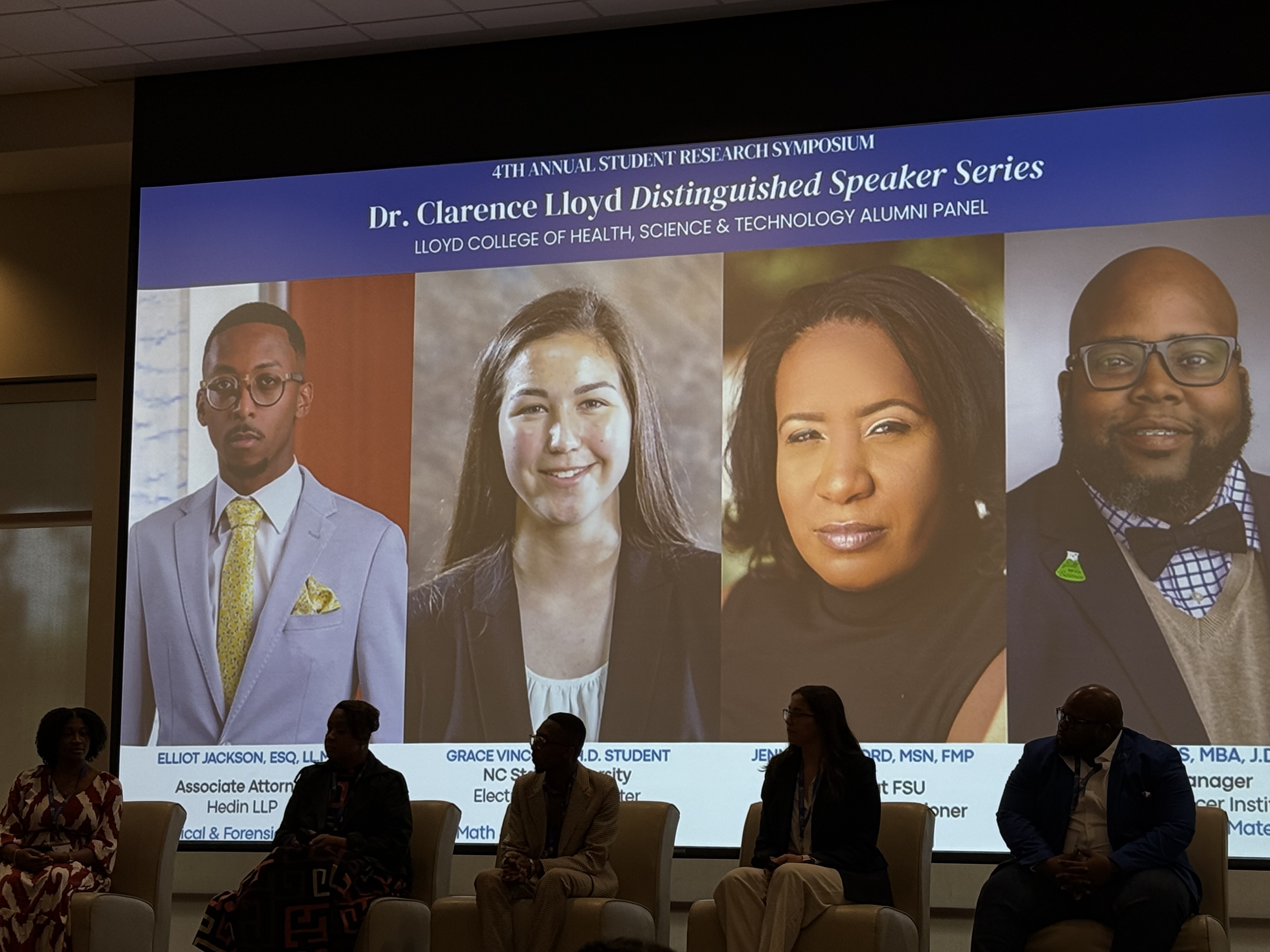
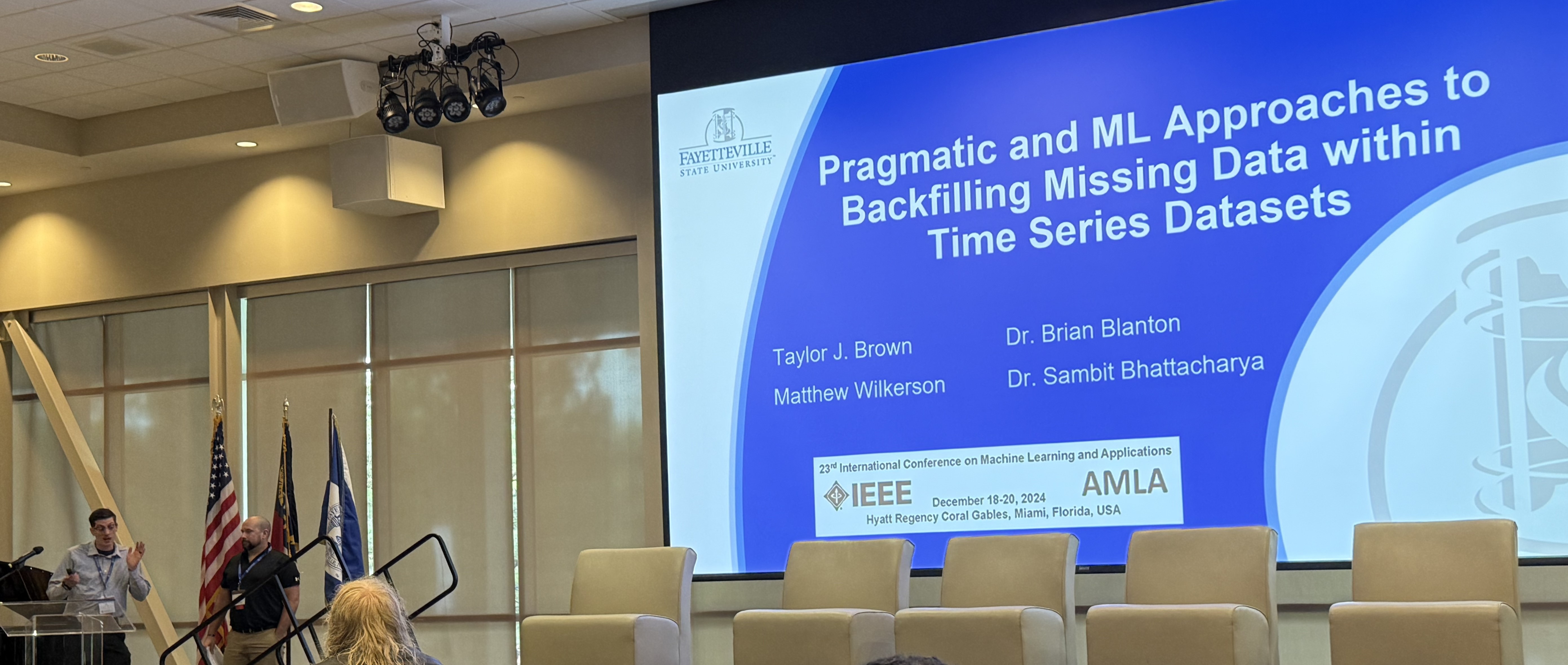
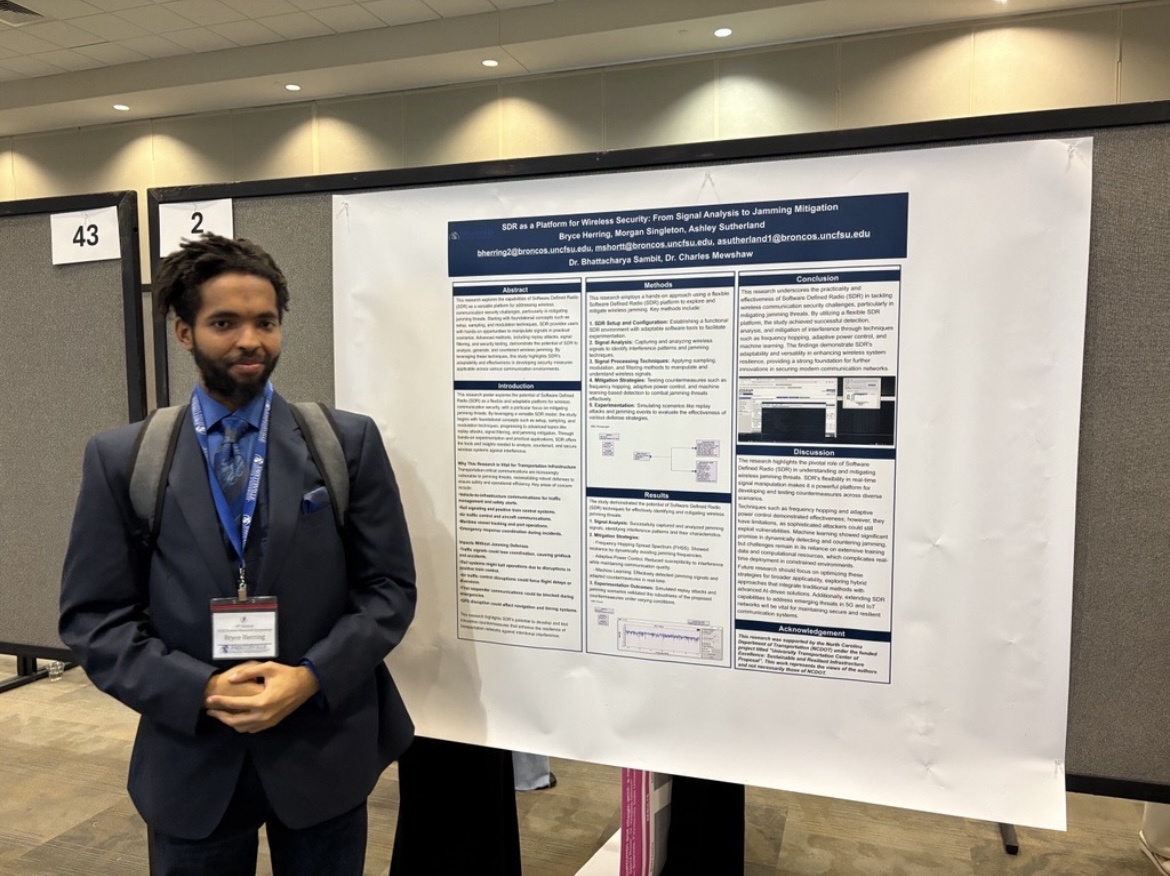
ISL Members who have accepted NASA 2024 Scholarships and NSA Internships
NASA Space Grant: MSI STEM Bridge Scholarship
Recipients: Anthony Gardner, Miriam Delgado, Morgan Shortt, Paul Rodriguez
Award Amount: $5000 Scholarship. One part awarded around end of Dec and second part awarded after May upon approval of Final Essay
Requirements:
-Fall Web Seminar and Information Session Attendance.
-Application to NASA Internship Program.
-Conduct Research according to NASA Mission Directorates.
-Interview faculty Member who teaches/conducts STEM Research.
-Submit a final report concerning the requirement tasks.
NSA 2024 Internship
Interns: Ashley Sutherland
Paid Salaried Intern
-Collaborate with a team of programmers and data scientists to help identify shortcomings
-Filtered and organized large amounts of data in a more readable format
-Discovered new techniques and use of graphing tools that improved organization and conciseness of writing code
-Utilized tools such as Jupyter Notebook for the development and organization of notebooks that aided in the graphical visualization of corporate data analysis
-Learned valuable skills and made Connections within NSA
ISL Members Earn Scholarships from the HDAA
Anita Amofah, Carrington Pearson and Ashley Sutherland of the Intelligent Systems Laboratory at FSU have received scholarships from the Healthcare Data and Analytics Association (HDAA).
To know more check the LinkedIn Article here.
ISL Students Summer Internship Experiences
Ashley Sutherland
National Security Agency
During the summer of 2024 I was able to participate in a summer internship with the National Security Agency. Through my internship I collaborated with a team of programmers and data scientists to help identify shortcomings and solve problems within the organization by applying my knowledge of the Python Pandas library to filter and organize large amounts of data that resulted in a more readable format to aid in decision making. I was able to refine my programming skills by discovering new techniques and use of graphing tools that improved organization and conciseness of writing code. I also utilized tools such as Jupyter Notebook for the development and organization of notebooks that aided in the graphical visualization of corporate data analysis tools which led to a better understanding of the importance of each tool and their dependencies. Overall, my internship was a very positive experience, and I am excited to hopefully be able to return as a summer intern next year. I have learned many valuable skills and made great connections within the agency that I hope to carry with me into my career, post-graduation.
Luis Hernandez
NASA Jet Propulsion Laboratory
I am Luis E. Hernandez and I did a summer internship with NASA Jet Propulsion Laboratory. In this internship, I worked on a project entitled "Using Machine Learning to Monitor Tropical Trees from Space" under the mentorship of Dr. Gary Doran. For this project, we worked with collaboration of several data scientists and ecologist from other research institutions such as the Smithsonian Tropical Research Institute. The main goal of our project was to develop a model that is able to detect and monitor tree species based on phenological factors such as flowering events, fruiting events, leafing events, and deciduousness. This will allow the scientific community to better monitor Earth's overall biodiversity and see how climate change can affect the lifecycle of tropical trees.
My main task for this project included testing out various methods, both supervised and unsupervised, in visualizing and filtering data. Our dataset is composed of satellite images and masks of a tropical forest canopy in Panama. This dataset was provided by Planet. I used Principal Component Analysis (PCA) and t-Distributed Stochastic Neighbor Embedding (t-SNE) to try and visualize and do some basic filtering of the dataset. I also implemented a machine learning based approach to filtering the data by using dinoV2 to extract image embeddings from our dataset and use said embeddings to train a model, RadomForestClassifier. We then compared this result to a baseline Normalized Difference Vegetation Index (NDVI) and found that the machine learning approach performed better than the baseline test. With this result, we hope to use this machine learning approach to better filter out data and to also possibly use it to classify data and have the model detect phenological events in tree canopies.
Jonathankeith Murchison
Minority Serving Cyberinfrastructure Consortium
I was selected to participate in the Minority Serving Cyberinfrastructure Consortium (MS-CC) Climate Science Research Internship at the University of Maryland Eastern Shore (UMES). My research focused on analyzing the correlation between asthma incidence and varying levels of PM2.5 pollution across different income areas from 2008 to 2017, with an emphasis on seasonal variations. As part of this internship, I had the opportunity to attend the PEARC24 Conference in Rhode Island, where I gained valuable insights into current advancements in the field. At the conclusion of the summer, I presented our research findings through both an oral and poster presentation at a symposium.
Carrington Pearson
Department of Energy DOE Savannah River Site
This past summer, I completed an internship at the DOE Savannah River Site as a cybersecurity intern. During this time, I engaged in hands-on experience with cybersecurity protocols, participating in Capture The Flag competitions and conducting vulnerability assessments. I collaborated with cross-functional teams to enhance network security, ensuring the protection of critical infrastructure. This internship allowed me to apply and expand my knowledge in a real-world setting, bridging the gap between academic theory and practical application.
Sini Santino
Future Computing NSA
I participated in the Future Computing Summer Internship for the Laboratory of Physical Science at the NSA. We were mentored by NSA staff as we carried out research within the field of High-Performance Computing (HPC). My project at first focused on testing mathematical algorithms for primality in a distributed environment using the Rust programming language. Later, the focus shifted to adding graph theory methods to the Pacific Northwest National Laboratory's Lamellar HPC library for Rust.
Natalie Griffin
Department of Defense
This summer, I worked as an intern in the DoD HBCU/MI 2024 Summer Internship Program, focusing on two key projects: Review Forge and Wing Walker. For Review Forge, I collaborated with a team of software engineers to author a detailed white paper that explored foundational AI technologies, such as Large Language Models (LLMs) like LLaMA3 and algorithms like XLNet, to automate performance reviews, making the process faster and more consistent. I played a significant role in selecting technologies that would enhance the automation and accuracy of performance reviews.
For the Wing Walker project, I applied semantic segmentation techniques to point cloud datasets and developed algorithms to enhance object detection capabilities. I implemented models like PTv3 and PPT for better segmentation and applied clustering algorithms and bounding boxes to measure distances between vehicles in the SemanticKITTI dataset, aiming to improve accuracy and operational safety on naval flight decks. These experiences deepened my understanding of AI's role in naval operations and enhanced my technical skills in AI development and implementation
Matthew Wilkerson
O-RISE Department of Homeland Security
I performed an internship under O-RISE's Department of Homeland Security Summer Research Team. My task was to experiment with machine learning algorithms to hindcast missing monthly-mean water values belonging to a dataset produced by water level sensors stationed throughout the East Coast, Gulf of Mexico, and Puerto Rico and Virgin Islands. The monthly-mean dataset feeds into a larger meteorological model, and hindcasting missing values should increase the meteorological model's accuracy. I optimized, trained, and evaluated several machine learning algorithms, including Random Forest models, boosted tree models, linear regression models, and support vector machines, culminating with implementing ensemble models, such as Voting Regressors, Bagging Regressors, and Stacking Regressors.
Taylor Brown
O-RISE Department of Homeland Security<
During my internship with the DHS ORISE facility, I focused on improving the quality and completeness of water level monitoring data across the US East Coast, Gulf of Mexico, Puerto Rico, and the Virgin Islands. My main objective was to address missing data in time series datasets, crucial for accurate environmental monitoring and coastal hazard management. I developed a comprehensive framework combining pragmatic and advanced machine learning techniques to calculate distances between sensors, analyze correlations, and assess relative intensity. These methods were key to identifying and filling data gaps, ensuring the accuracy and reliability of the datasets. I also visualized the results through maps and correlation matrices, providing insights into spatial relationships. This experience deepened my understanding of data imputation and machine learning models, particularly in environmental contexts, and honed my skills in data analysis tools.
Lucinkey Lucien
North Carolina Information Technology Department
During my summer internship with the North Carolina Information Technology Department (NCDIT), I had the opportunity to work with the Enterprise Application team at the NC Department of Transportation (NC DOT). In my role as a project manager and business analyst, I contributed to a significant project aimed at overhauling the DMV's current system, transitioning from DB2 to a cloud-based platform. This project also involved improving the applications and services provided by the DMV, ensuring they meet modern standards and enhance user experience.
Anita Amofah
Peake
During my Peake internship in the summer of 2024, I conducted in-depth research on small businesses across the United States, helping them harness AI and big data tools to remain competitive with large enterprises. I also contributed to federal contracting efforts, where I worked closely with these businesses to strengthen their cybersecurity posture and foster sustainable growth. In addition, I delivered detailed briefings to business personnel, offering actionable strategies to enhance their search engine optimization (SEO), improve digital visibility, and drive more traffic to their online platforms. This experience allowed me to develop strong research, consulting, and communication skills while supporting the growth of small businesses in various industries.
Matt Wilkerson presents research at DATAWorks 2024 and the 3rd Annual Student Research Symposium
ISL (Intelligent Systems Laboratory) Member Matthew Wilkerson held a presentation “Advancing Edge AI: Benchmarking ResNet50 for Image Classification on Diverse Hardware Platforms”, co-authored with fellow JPL (Jet Propulsion Laboratory) Researchers.
More information can be found here
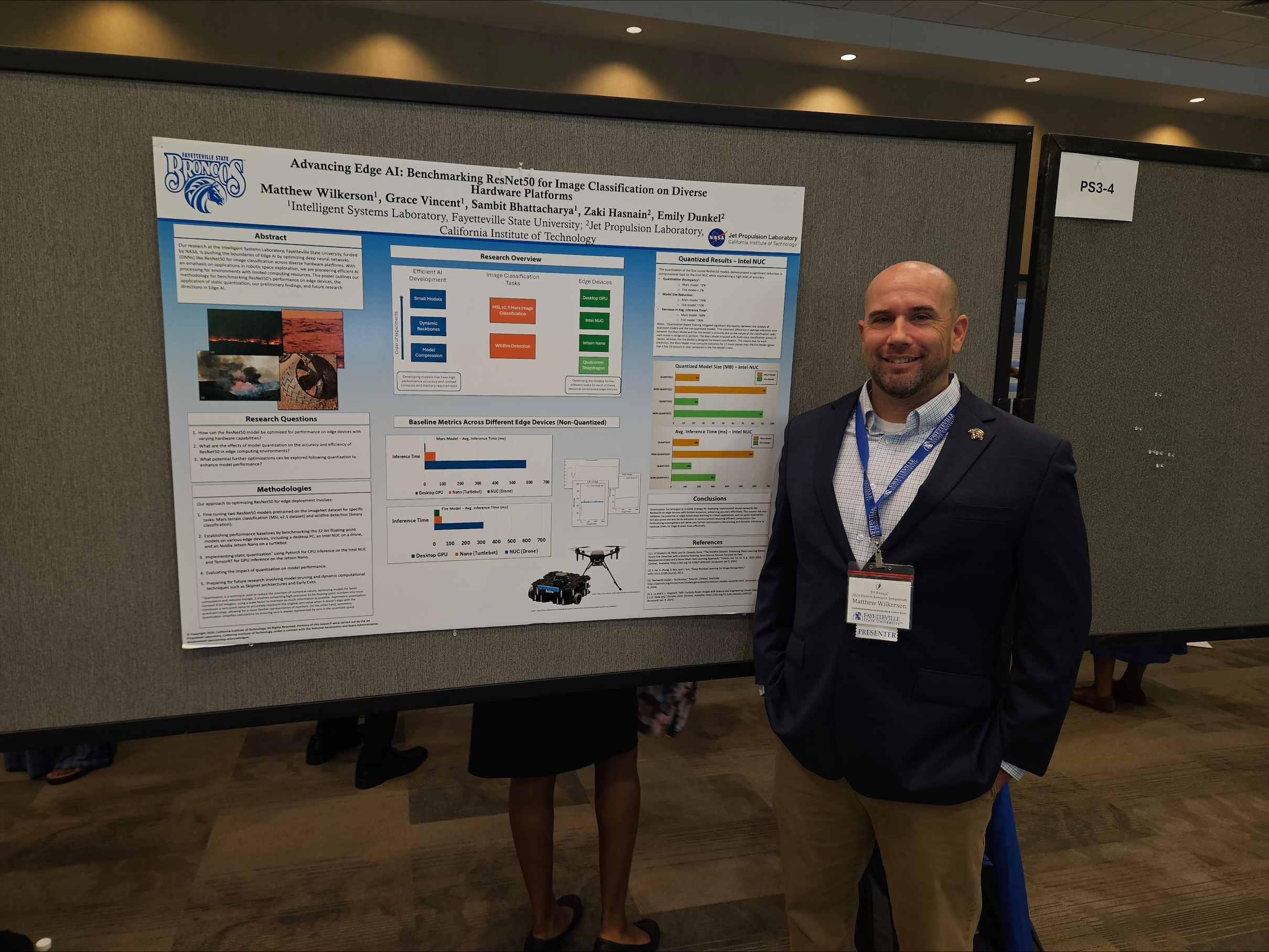
ISL Director continues funded collaborator with NC State’s Laboratory for Analytic Sciences (LAS)
Sambit Bhattacharya, Ph.D., a computer science professor at Fayetteville State University, has embarked on a collaborative research initiative with the Laboratory for Analytic Sciences (LAS) at NC State University to advance artificial intelligence for national security purposes. Bhattacharya's project, funded for the second consecutive year, focuses on developing AI software capable of detecting rare and uncommon objects in video footage, catering to the needs of the National Security Agency (NSA).
More info can be found on this article here
Interdisciplinary Faculty team awarded grant for research on AI applied to Health Equity
A team of faculty members from various departments at Fayetteville State University has secured a $100,000 grant from the Artificial Intelligence (AI) and Machine Learning (ML) Consortium to Advance Health Equity and Researcher Diversity (AIM-AHEAD). Collaborating with ISL Director Sambit Bhattacharya, Ph.D., the team aims to enhance research capacity in AI applied to Health Equity. Collaborating across computer science, biology, and nursing disciplines, they plan to utilize AI technology to analyze large healthcare datasets and address disparities in minority healthcare. With a focus on creating a comprehensive network of scholars and practitioners, the team aims to establish an AI Lab on Health Equity, facilitating workshops and symposia to identify research thrusts, gaps, and technological methods. This initiative aligns with the AIM-AHEAD consortium's goal of leveraging AI to improve health equity, with funding primarily provided by the National Institutes of Health.
More info can be found here
ISL Student and Faculty Accomplishments in 2023: a Year in Review
Student Accomplishments
- Adriel Alvarez-Collazo
US Army Internship
- Ahzsa Strange
NSA Internship
LAS symposium Presenter
- Anita Amofah
FSU Pre-MacNair Program Acceptance
- Antonio Ball
MITTC Finalist
- Ashley Sutherland
NSA internship
LAS symposium Presenter
- Carley Brinkley
MITTC Finalist
Emerging Researchers Network 2024 Conference Presenter
- Carrington Pearson
National Cybersecurity Alliance HBCU Scholarship
- Catherine Spooner
- Garrett Davis
Emerging Researchers Network 2024 Conference Presenter
- Garrett Sheireiff
McNair Scholars Program Acceptance, NC Space Grant MSI STEM Bridge Scholarship
MITTIC Finalist
- Givante Lewis
- Jeremy Graves
NC Space Grant MSI STEM Pathways Scholarship
- Laura DeSantis
Paychex Job Offer
Emerging Researchers Network 2024 Conference Presenter
- Leviticus Lintag
NC Space Grant MSI STEM Bridge Scholarship
MITTC Finalist
- Matthew Wilkerson
2024 FBI Internship
NC Space Grant MSI Bridge Scholarship
National Cybersecurity Alliance HBCU Scholarship
MITTIC Finalist
- Natalie Griffin
Winning entry to Final round of the HBCU xTECH competition
- Nathan Couch
UCF Grad School Admission Offer
- Oumar Toure
MITTC Finalist
- Paul Rodriguez
NC Space Grant MSI STEM Pathways Scholarship
MITTIC Finalist
- Tivon Brown
- Toby White
NC Space Grant MSI STEM Pathways Scholarship
Faculty Accomplishments
- Sambit Bhattacharya
UNC Board of Governors award for Excellence in Teaching
Dr. Bhattacharya has been honored by the UNC Board of Governors Award for Excellence in Teaching
Links for more info: Article 1 , Article 2 , Article 3
Part-time Visiting Scientist at the National Geospatial Intelligence Agency
Dr. Bhattacharya has been appointed as part-time Visiting Scientist at the National Geospatial Intelligence Agency (NGA). Under this appointment he will work with NGA researchers to solve complex problems faced by the agency in the application of Artificial Intelligence to GEOINT. Geospatial intelligence, or GEOINT is the exploitation and analysis of imagery and geospatial information to describe, assess and visually depict physical features and geographically referenced activities on the Earth. GEOINT consists of imagery, imagery intelligence and geospatial information
FSU Finalist Team at NASA MITTC
May 2, 2023
A team from FSU became a finalist in NASA’s MUREP Innovation and Technology Tech Transfer Idea Competition (MITTC), against six other teams all in pitching business plans on NASA-originated technology.
The FSU’s team business plan was to create ASAPA: an autonomous swarm drone for solar panel maintenance, automation, and transport.
You can see FSU’s ASAPA Team Project Introduction here and information about the competition at this article.
Dr. Bhattacharya wins the 2023 UNC Board of Governors Excellence in Teaching Award
APRIL 28, 2023
Fayetteville State University in North Carolina congratulates Dr. Sambit Bhattacharya, a professor in the Department of Mathematics and Computer Science, for receiving the 2023 Excellence in Teaching Award from The University of North Carolina Board of Governors. He is one of 17 faculty members from public universities in North Carolina who have been honored with this award. The recipients were nominated by committees at their respective institutions and chosen by the Board of Governors Committee on Educational Planning, Policies, and Programs.
The award includes a commemorative bronze medallion and a cash prize of $12,500 for each winner. A future ceremony will be held at each recipient's institution to honor their achievements.
For more information read:
UNCFSU article
Award Recipients
University Awards
Igniting Curiosity: Reedy Creek Middle School Outreach on AI and NASA's Artemis Mission
April 18, 2023
Reedy Creek Middle School hosted an outreach event that aimed to introduce their students to Computer Science, Artificial Intelligence, and their correlation with space exploration. Dr. Bhattacharya and his team from Fayetteville State University shared insights on their research and NASA's Artemis space mission. The event successfully sparked curiosity among the students, helping them gain a deeper understanding of the dynamic relationship between science, AI, and space discovery.
More information about the outreach can be found at the Reedy Creek Middle School's Facebook.
FSU TO HOST AN ARTIFICIAL INTELLIGENCE AND CYBERSECURITY HACKATHON
February 24 – 26, 2023
Fayetteville State University will host a Hackathon from Feb 24 - 26, 2023 where students can participate to solve homeland security issues in "real-world" designed intelligence and cybersecurity scenarios.
This event is in partnership with Arizona State University (ASU) and is funded by the Department of Homeland Security (DHS) to help maintain an active pipeline of new homeland security professionals.
For more information visit the University’s LinkedIn and news site.
NC Space Grant Pathways and Bridge Scholars Announced!
December 2, 2022
The 2022-23 recipients of the Minority Serving Institution (MSI) STEM Bridge Scholarship and of the MSI STEM Pathways Scholarship Program have been formally announced! Representing Fayetteville State University, MSI STEM Bridge Scholars includes Antonio Ball, Carley Brinkley, Khali Crawford, Morgan Jackson, Deneen Royal, and Antwaun Tune. Also from Fayetteville State University, MSI Stem Pathways Scholars includes Ashley Sutherland. Congratulations to all the recipients for your achievements, through your continued hardwork and perseverance.
More information about each students success and can be found from the following article.
FSU COMPUTER SCIENCE STUDENTS’ NASA EXPERIENCE LEADS TO NEW BUSINESS VENTURE
November 22, 2022
FSU Computer Science students and alumni have started a new business venture after going through NASA’s Minority Serving Institutions Space Accelerator program during the summer. With the NASA Innovation Corps (I-Corps) Pilot Program Grant they are looking for potential partners in this entrepreneurial project.
Sambit Bhattacharya serves as the Principal Investigator and Technical Lead.
Daniel Rundell is the Entrepreneurial Lead.
For more information visit the University’s LinkedIn and news site.
North Carolina Defense Summit: Academic Research Panel
Dr. Bhattacharya was a panelist at the North Carolina Defense Summit which was held in Raleigh, NC on September 27th 2022. Other professors from the University of North Carolina System and professionals working in defense related research were members of the panel. Dr. Bhattacharya spoke about best practices for collaboration between the Department of Defense (DoD) and universities on Artificial Intelligence research. He also listed some best practices for the DoD when working with Historically Black Colleges and Universities (HBCUs) like Fayetteville State University. More information about the summit can be found here.
Fayetteville State University Receives Funding From North Carolina Collaboratory
Dr. Sambit Bhattacharya recently received from the Collaboratory for his research on Artificial Intelligence (AI) drone software that aims to improve drone performance in confined and geographically complex areas during AI-led search operations. You can read more about their experience from the following article.
Fayetteville State University Students’ NASA Experience Leads to Potential Business
ISL students recently returned from a trip to California where they visited NASA’s Jet Propulsion Laboratory. While there, they also had the opportunity to meet with potential investors and mentors from NASA. During this trip they learned about patenting new technologies, writing grant proposals, and telling the “story” of their concepts. You can read more about their experience both from NASA’s press release and Fayetteville State's press release. You may also hear an interview with Dr. Bhattacharya and ISL students Grace Vincent and Khali Crawford with this link to the podcast. Their section of the interview starts at about the sixteen minute mark.
Fayetteville State Student Research Team Presents Winning Design in NASA’s University Student Design Challenge 2021-2022
Two students from Fayetteville State's Intelligent Systems Lab, Laura DeSantis and Kyle Schultz, and NCSU student Chris Arsenault, alongside their FSU faculty advisor, Sambit Bhattacharya, Ph.D, travelled to NASA’s Glenn Research Centers to present their winning project: “Improving the Design of Heat Exchangers with Artificial Intelligence.” Read more from university news site.
NASA Selects Minority-Serving Institution Proposals to Receive Support
The awardees in the first MSI Space Accelerator have been announced after a competitive application process in which they were encouraged to think like startup businesses. Fayetteville State's Intelligent Systems Laboratory included amongst winners with our proposal, “Autonomous Systems With On-Demand Inference From Perception Pipelines”. Read more from Jet Propulsion Laboratory news site
Our Team Won at NASA's MSI Space Accelerator Final!
Great news! A team from our lab has been awarded seed money and immersion in a training program for creating a startup by commercializing research results. Read more from university LinkedIn and news site.
NSF Award for Trustworthy and Socially Responsible AI
Recent progress in AI, the digital transformation of work and human communication has created a wide range of possible applications of AI. While it will take more time and effort to realize its full potential these areas, the risks of adopting AI are an urgent and important problem because it can potentially cause harm when it is prematurely deployed before being tested for trustworthiness. Our lab has received grant funding from the National Science Foundation to pursue research and education on trustworthy and socially responsible AI. Read more from university LinkedIn post and news site.
Telvin Vann and Elijah Bryant completed their Senior Design with co-advisors from LAS/DoD
The Laboratory for Analytic Sciences (LAS) partnered with Dr. Sambit Bhattachayra, Professor of Computer Science at Fayetteville State University (FSU) and students enrolled in a Computer Science Senior Design course to devise a rendering engine that generates synthetic data on rare objects to improve the robustness of computer vision models for object detection. With the mentorship of the LAS team and Dr. Bhattacharya, the senior design students programmatically rendered over 4000 objects, including variations such as differences in object angles, shades and environments, thus dramatically increasing training datasets for objects that are underrepresented or not represented at all in an existing dataset. To demonstrate the outcome of the rendering engine, the FSU senior design students and Dr. Bhattacharya were invited to the LAS to present their research on synthetic data generation to over 100 members in the U.S. Department of Defense. This gave the senior design students the opportunity to showcase their talents on AI/ML, critical thinking, applying advanced technological approaches to problem-solving and assisted with developing a capability of significant size and impact to the U.S. Department of Defense.
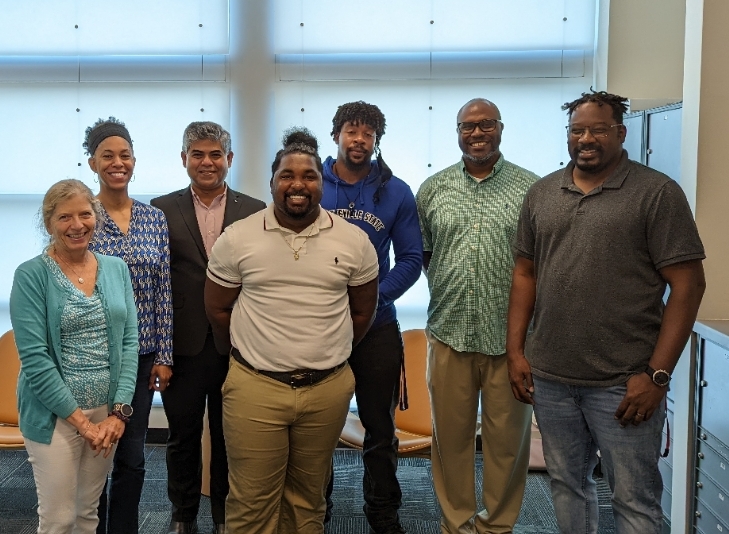
Fayetteville State University Spring 2022 Computer Science senior design students and Dr. Sambit Bhattacharya, Professor of Computer Science, visited the Laboratory for Analytic Sciences to present their research to the U.S. Department of Defense (June 2022)
Graduate School and Scholarships for Students, Summer 2022
Congratulations to Grace Vincent for admission to PhD in Electrical Engineering at NC State University. She has been awarded full financial support and the Provost's Fellowship!
Congratulations to Ejijah Bryant for admission to MS in Computer Engineering at NC State University.
Congratulations to Carley Brinkley for scholarship award from the Grace Hopper Conference.
Internship Offers for Students, Summer 2022
Congratulations to the following students for being selected for internships:
Grace Vincent and Jonathan Soltren: Jet Propulsion Lab, NASA
Nathan Couch: Johnson Space Center, NASA
Ahad Qureshi: SAS Institute Inc.
Antwaun Tune: Lenovo Inc.
Gabriel Ohmes, Khali Crawford, and Laura DeSantis: Naval Research Laboratory
Elijah Bryant: Laboratory of Analytical Science at NC State University
Daniel Bigler and Carley Brinkley: North Carolina Department of Transportation
Deneen Royal, Jack Santini, and Catherine Spooner: Corvid Technologies
Team AERISS Goes to the Final Round of the NASA MITTIC 2022 Competition!
Congratulations to the MITTIC team and well deserved after months of hard work in preparing for the competition. Read more from university LinkedIn post here.
Fayetteville State Graduate Grace Vincent admitted to Doctorate Program at NCSU
23 June 2022
Fayetteville State University and ISL alumna Grace Vincent will continue her studies at North Carolina State University as an Electrical Engineering Ph.D. student. She will be studying and researching applications for Machine Learning, Pattern Recognition, and Computer Vision. Additionally, she was awarded the Provost's Doctoral Fellowship which will cover her tuition and an excess of 30k will be used to fund her research. In the meantime, she is spending the Summer at an internship with NASA's Jet Propulsion Laboratory as a Computer Vision Intern working with Martian image segmentation.
DANC S&T Forum with Presentations from Vector Analytics and Fayetteville State University
Dr. Bhattacharya will present on “Use-inspired Research in AI/ML at the Intelligent Systems Lab” at the Science & Technology Forum of the Defense Alliance of North Carolina. The agenda is available here
Update on ISL Student Accomplishments
SNCURCS attendance
Khali Crawford will be attending and presenting at the SNCURS (State of North Carolina Undergraduate Research and Creativity Symposium) about the construction and functions of a semi-autonomous robotic tank swarm. This tank swarm would be used for exploration and terrain mapping utilizing Ultra-Wide Broadband sensors and satellite overhead. This project would assist NASA Artemis Mission, a NASA project to return to the moon by 2024.
ASGSR attendance
Ahad Qureshi attended the ASGSR (American Society for Gravitational and Space Research) conference. The conference led the discussion of plans of returning to the moon, the development of sustainable lunar habitation, and preparing the moon as a base for the exploration of Mars. The topic the conference used as the focus to achieve the aforementioned goals was space biology, the study of biology when exposed to the effects of deep space for a long duration of time.
North Carolina Department of Transportation Research & Innovation Summit – 2021
Dr. Bhattacharya presented on the topic of “Deep Learning Software for Traffic State Prediction” at the Summit hosted by the University of North Carolina Highway Safety Research Center. The recorded presentation is available under “NC Transportation Center of Excellence on Mobility and Reducing Congestion” on the agenda page
Dr. Bhattacharya was a speaker at the TechNet Symposium
The goal of the TechNet Symposium is to allow a forum to demonstrate new, innovative ideas and share best practices that promote valuable results to technology challenges faced by our military today, especially in the Fort Liberty area. This year the symposium was held in the Emerging Technology Institute (ETI) in Red Springs, NC on September 16 – 17. Dr. Bhattacharya speech titled Emerging Applications of Artificial Intelligence and Deep Neural Networks was scheduled for September 16th beginning at 10 am. For more details see technetfortbragg.com and bizfayetteville.com.
Fayetteville State University Wins NASA Grant to Support Artemis Space Technology
Fayetteville State University is one of seven universities which has been selected for grant supported research to move forward NASA’s Artemis mission. FSU’s research project titled Active and On-demand Multi Robot Perception (AOMRP) aims to develop multi-robot perception, a technology that utilizes highly specialized image sensors, to support NASA’s use of autonomous multi-robot systems performing scouting missions on the surface of the Moon or other planets. This project which will be hosted by the ISL builds upon previous work in Robotics and Artificial Intelligence at the lab. The award was announced at the site. This is the FSU News release about the award.
DoD Announces Winners of the Fiscal Year 2020 Nunn-Perry Award with Fayetteville State University as Partner in the DoD Mentor Protégé Program
The Department of Defense (DoD) Office of Small Business Programs (OSBP) recently awarded Booz Allen and Masego a 2020 Nunn-Perry Award for collaboration and impactful innovation under the DoD Mentor Protege Program (MPP) and development of the Masego Advanced Demographic Attribution (ADA) Data as a Service capability, with Fayetteville State University (FSU) provided critical support in partnership with Booz Allen and Masego. Two of the FSU student team leads were hired by Masego and have continued to support the project beyond graduation. The ISL provided on-site computational resources including dedicated and special-purpose hardware and software which were crucial to FSU's critical support in this partnership. The award was announced at the site. The link to the FSU News release site is FSU sites.
Students win Research Scholarship
Fall 2020 to Spring 2021
Grace Vincent and Nkombe Maro have been awarded a scholarship by the NC Space Grant’s Undergraduate Research Scholarship program to support their research in the ISL lab. Grace and Nkombe will work on the applications of Artificial Intelligence and Machine Learning for time-series predictions for Manufacturing and Metrology
Fayetteville State University AI Workshop
July 20 - 24, 2020
Students and faculty will host a workshop on AI at Fayetteville State University. Click here for the agenda.
Workshop materials including slides of keynotes, notebooks, and data files can be accessed from the Workshop Github Repository
Center of Excellence funded by the North Carolina Department of Transportation
July 20 - 24, 2020
The North Carolina Department of Transportation has awarded funds to create University Research Centers of Excellence (CoE). As part of the CoE for Enhancing Mobility and Reducing Congestion established at North Carolina State University (NCSU), researchers from the ISL lab will work on the project titled Transportation Deep Learning Software for Traffic State Prediction. Read more from the WRAL Tech Wire news article.
Students Win US Department of Homeland Security Internship Offers
Summer 2020
Two students, Grace Vincent and Raymond Kimble have received offers of summer internship at the Coastal Resilience Center (CRC) located in the University of North Carolina, Chapel Hill. The CRC is funded by the US Department of Homeland Security (DHS). During this DHS sponsored internship Grace and Raymond will develop computational approaches to increase the accuracy of storm surge prediction in coastal areas of the US, specifically in North Carolina.
Student wins Research Scholarship
Summer 2020 to summer 2021
Joshua Hilbish has been awarded a scholarship by the NC Space Grant’s Undergraduate Research Scholarship program to support his research in the ISL lab. Joshua will work on the applications of Artificial Intelligence and Machine Learning to Manufacturing and Metrology
Students Participate in NanoTechnology Entrepreneurship Challenge
Spring and Summer 2020
Two students, Germaine Gregory and Raymond Kimble are participating in the 2020 NanoTechnology Entrepreneurship Challenge – Multicultural and Underrepresented Nanoscience Initiative (NTEC – MUNI). NTEC-MUNI 2020 is supported by Virginia Tech’s NSF-funded National Center for Earth and Environmental Nanotechnology (NanoEarth). Winning teams receive a cash award to help develop their concept as well as business development mentorship for their innovative idea. For more details, visit NTEC-MUNI
AAAI Symposium
March 23 - 25, 2020
Dr. Bhattacharya will present research at the Spring 2020 Symposium of the Association for the Advancement of Artificial Intelligence. Click here to visit the AAAI Symposium.
Read papers and presentation slides, specifically “Physics-Guided Machine Learning for Self-Aware Machining” at the Artificial Intelligence in Manufacturing symposium site.
Booz Allen / Masego Meeting
February 20 - 21, 2020
Dr. Bhattacharya and his students attended meetings with Booz Allen and Masego in Virginia
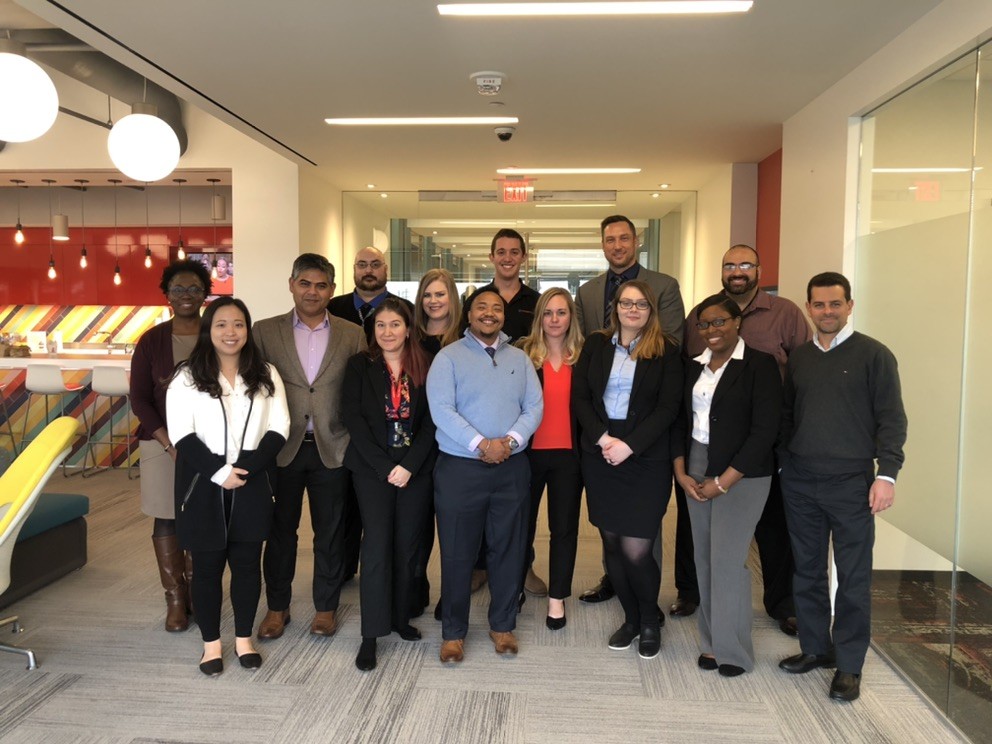
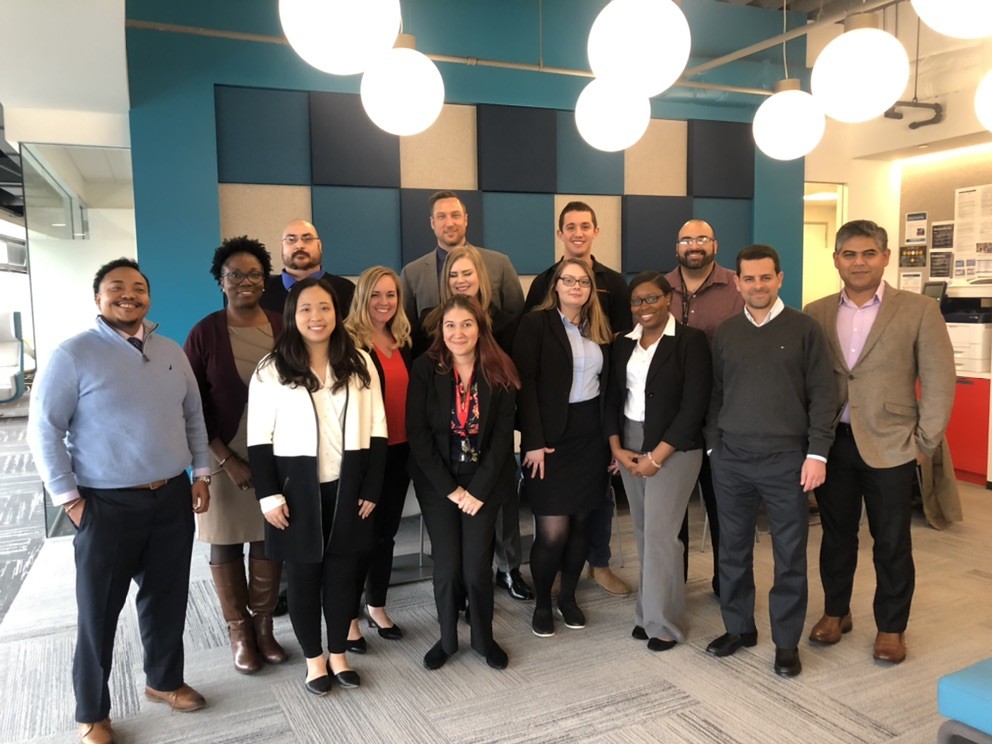
Emerging Researchers Network conference
February 6 - 8, 2020
Dr. Czejdo and one of our students, Frank Penhallegon, attended ERN. Click here to visit ERN
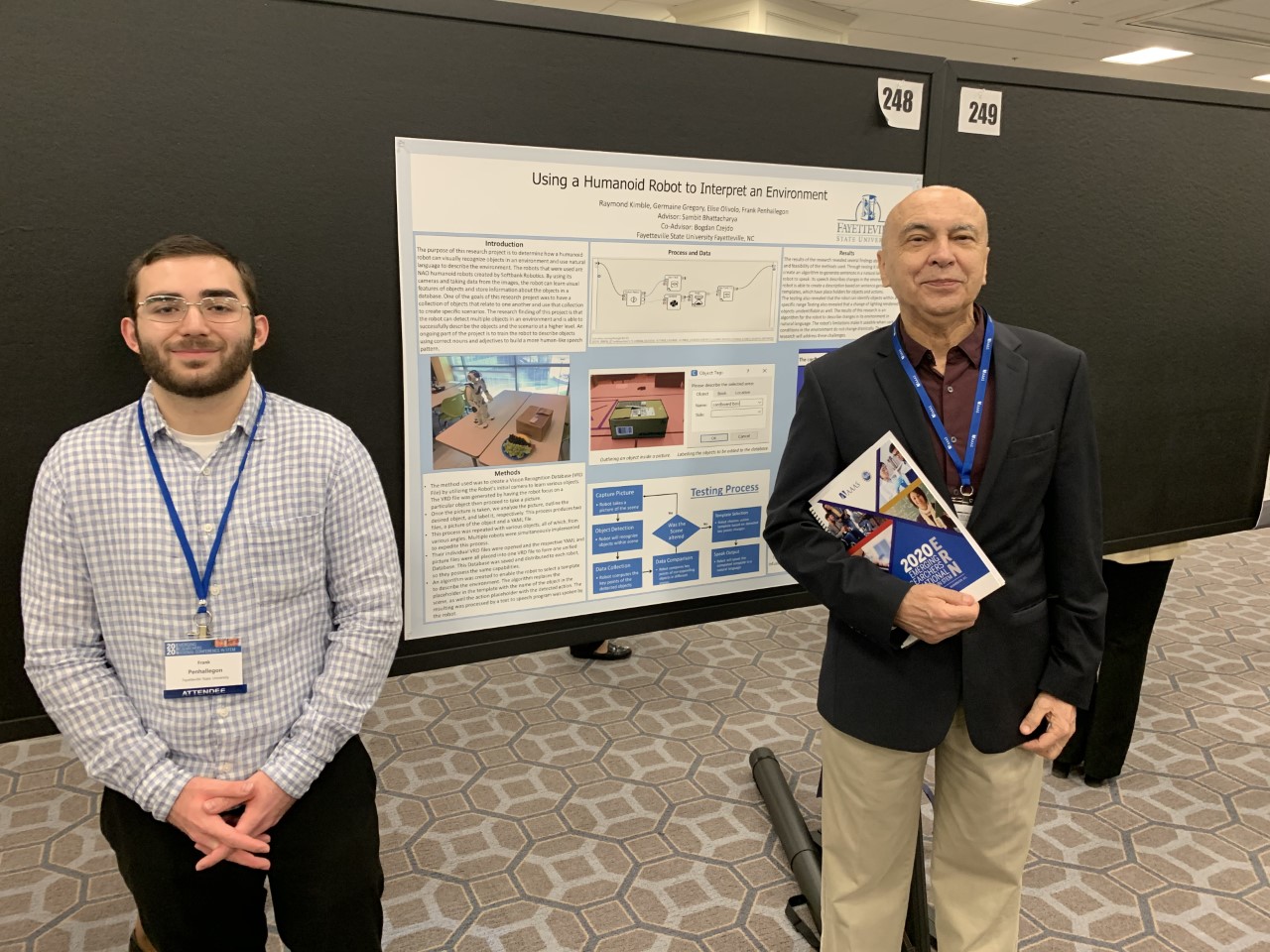
iNaCoMM 2019
December 5 - 7, 2019
Dr. Bhattacharya was invited to be a keynote speaker at iNaCoMM in India. Click here to visit iNaCoMM2019
GEOINTegration Summit
September 27 - 28, 2019
Dr. Bhattacharya was been invited to be a speaker at the GEOINTegration Summit. He participated in the discussion entitled: Curriculum Design Through Collaboration and Integration. Visit the GeoINTegration Summit website.
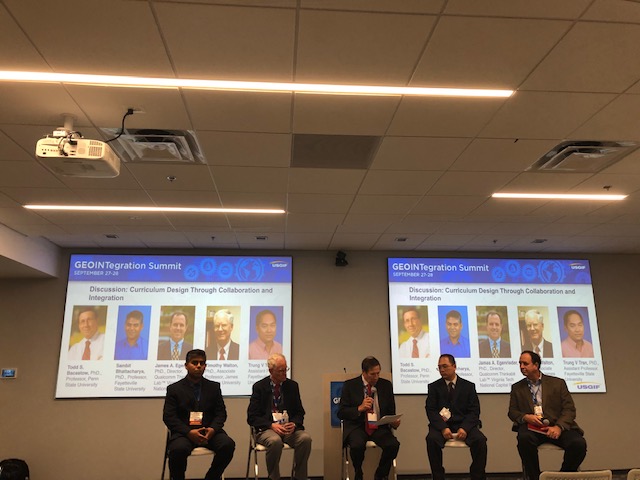
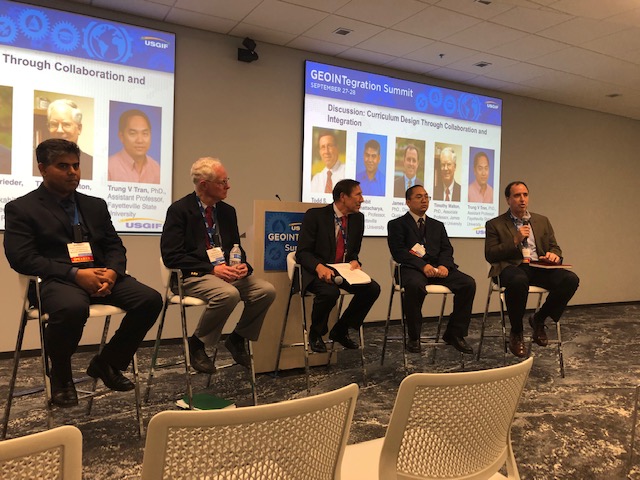
Booz Allen and Masego, Inc. Career Development
September 23, 2019
Booz Allen Hamilton and Masego, Inc. visited our campus to talk to students about career opportunities at their respective companies, and with the companies in their extensive network.
CyberCarpentry 2019
July 16-27, 2019
Dr. Bhattacharya was invited to teach an NVIDIA class in Image Captioning and Artificial Intelligence at the Cyber Carpentry symposium in Chapel Hill, NC.
CSAM Annual Meeting
May 14-15, 2019
Dr. Bhattacharya and the CSAM students attended the annual meeting for the CSAM project in Charlotte, NC. While there, the students presented their recent work in a poster session.
Masego Research Training
Apr 26, 2019
Masego, Inc. came to our campus in the afternoon for a workshop to train the students who will be participating in our GEODATA project over the summer. The training covered information retrieval strategies, as well as ArcGIS usage. The information gathered is to be standardized (as defined by Masego, Inc.) and then attributed to existing geospatial locations.

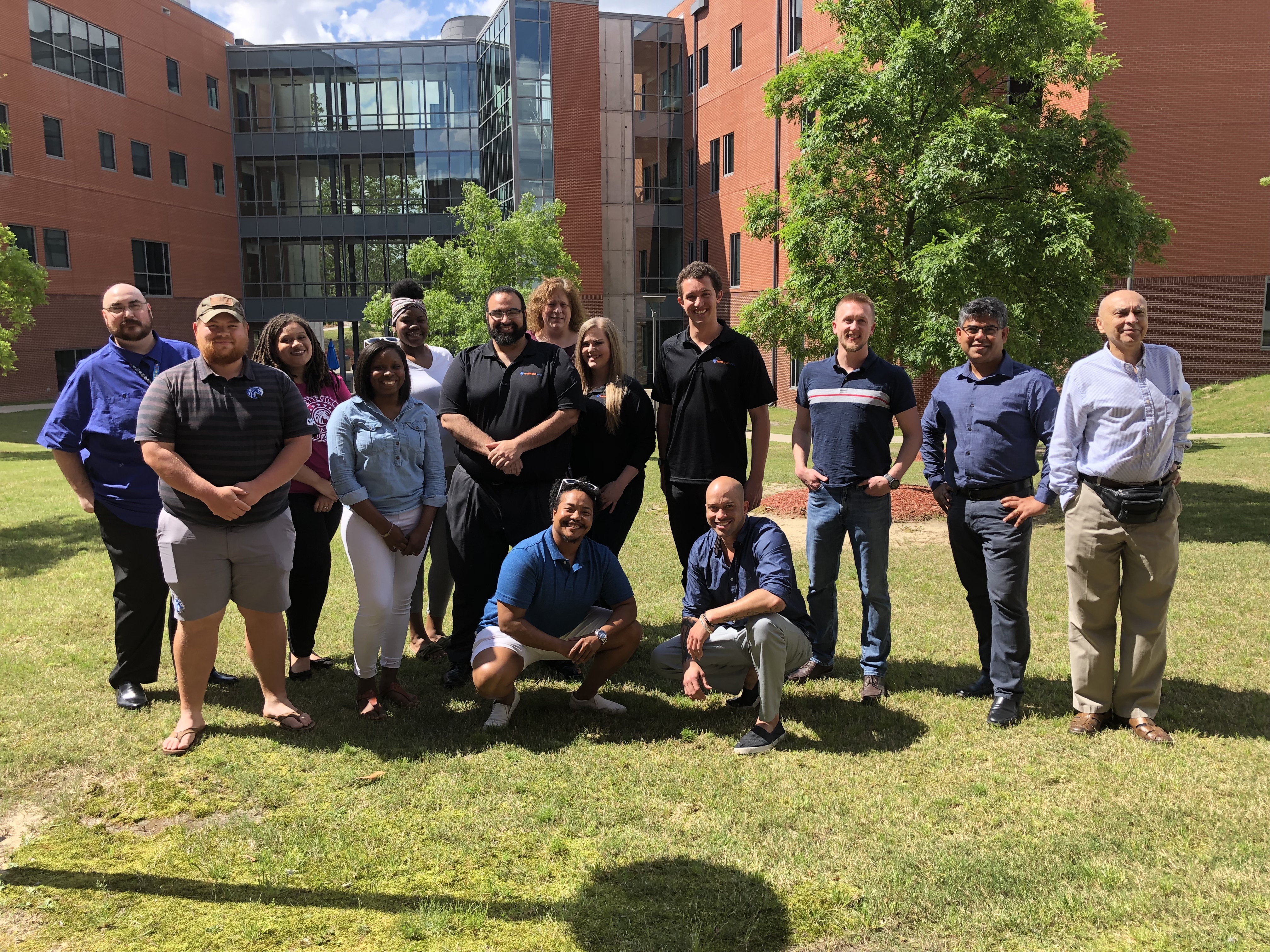
Booz Allen and Masego, Inc. Career Development
Apr 26, 2019
Booz Allen Hamilton and Masego, Inc. visited our campus in the morning to talk to students about career opportunities at their companies, and with the companies in their extensive network. They also discussed ways for students to prepare themselves for the job they want.
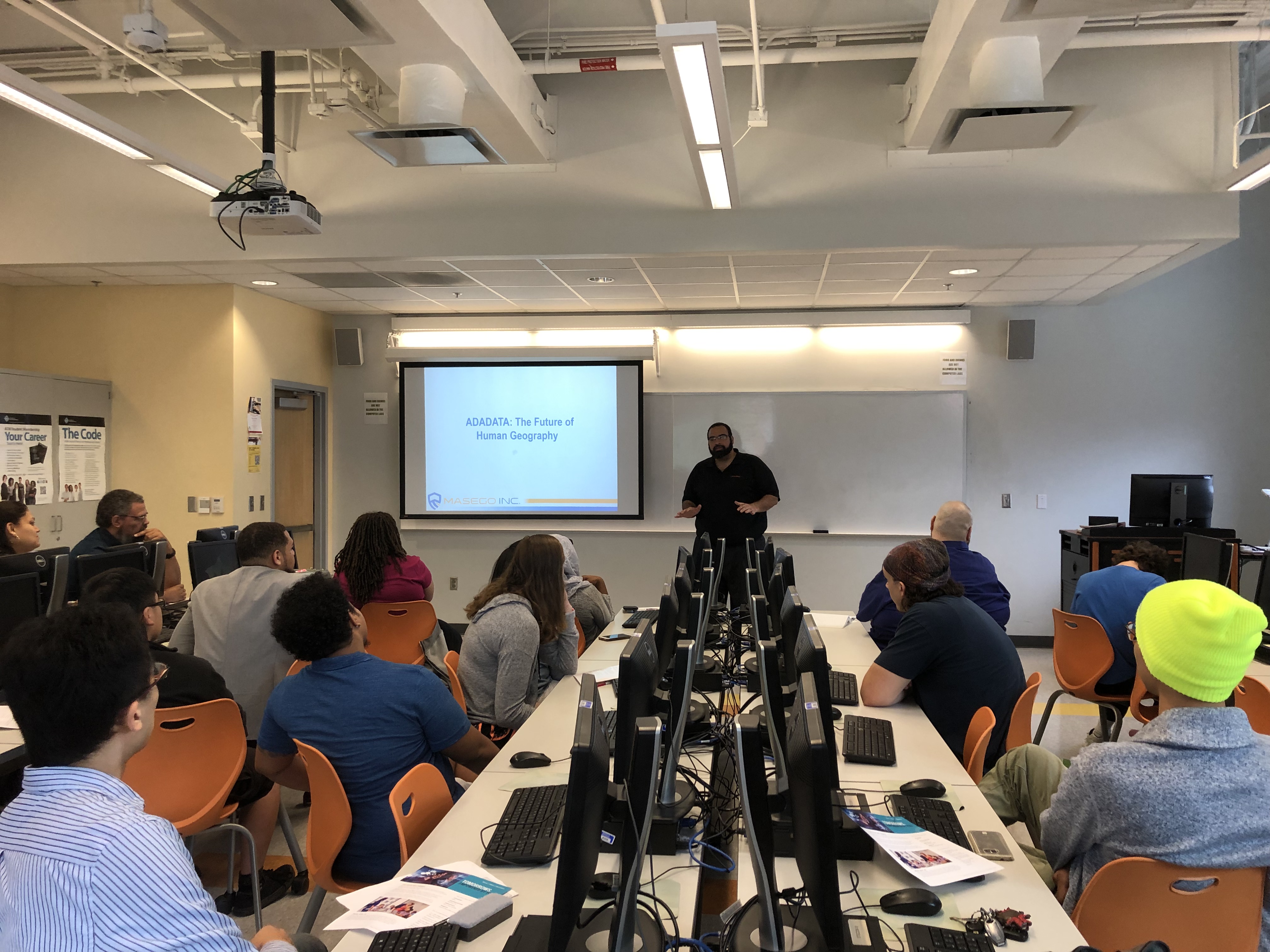
North Carolina Space Symposium
Apr 5, 2019
Kesharra West, Jordan Hupp and Catherine Spooner presented their work in a poster presentation at the NC Space Symposium in Raleigh, NC.
Visit the NC Space Symposium
Fayetteville State University Symposium
Apr 5, 2019
Several of our students attended the FSU Symposium in Fayetteville, NC to present their recent work. Dalisha Rivera-Rodriguez, Jeremiah Prieto and Kevin Kabbes presented their recent work in an oral presentation. Elise Olivolo, Germaine Gregory and Raymond Kimble presented their recent work in a poster presentation.
Visit the FSU Symposium
Panel: Artificial Intelligence and Data Analytics: Army Questions to Answer, Industry Trends, and How Industry Can Help the Army Leverage AI.
Mar 26, 2019
Dr. Bhattacharya was a panelist at the Ft. Bragg Technet Conference, in Fayetteville, NC.
Visit the Ft. Bragg Technet
